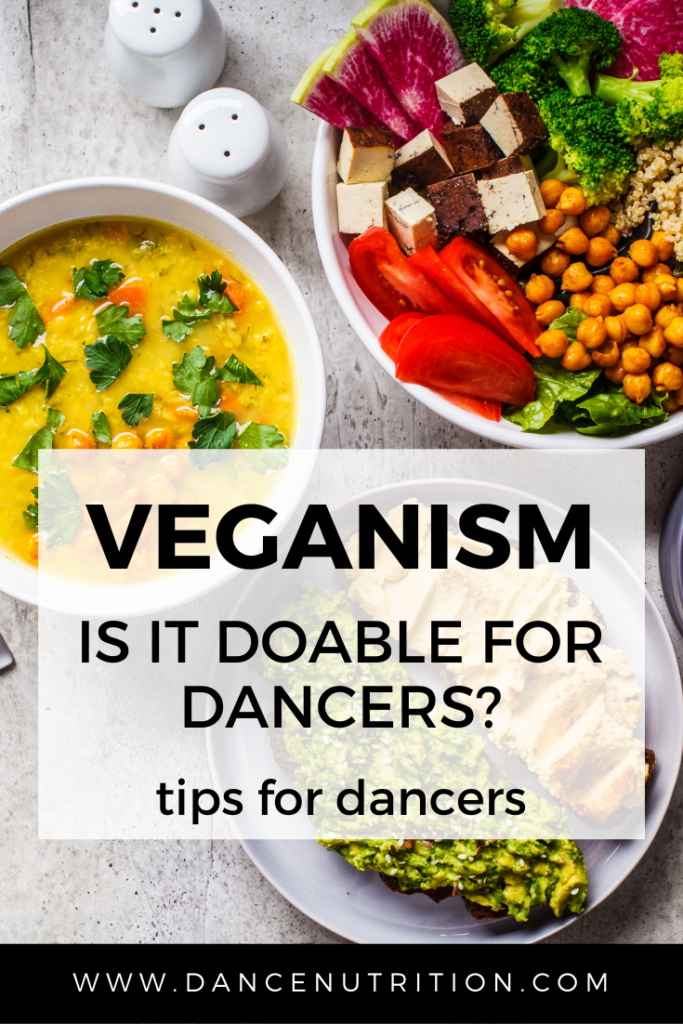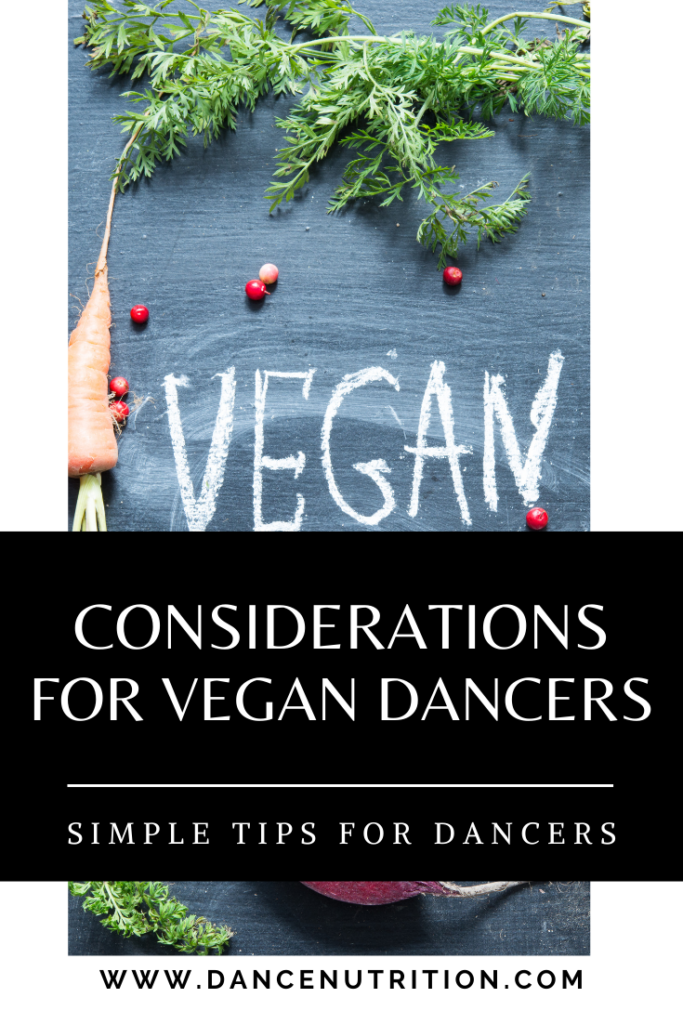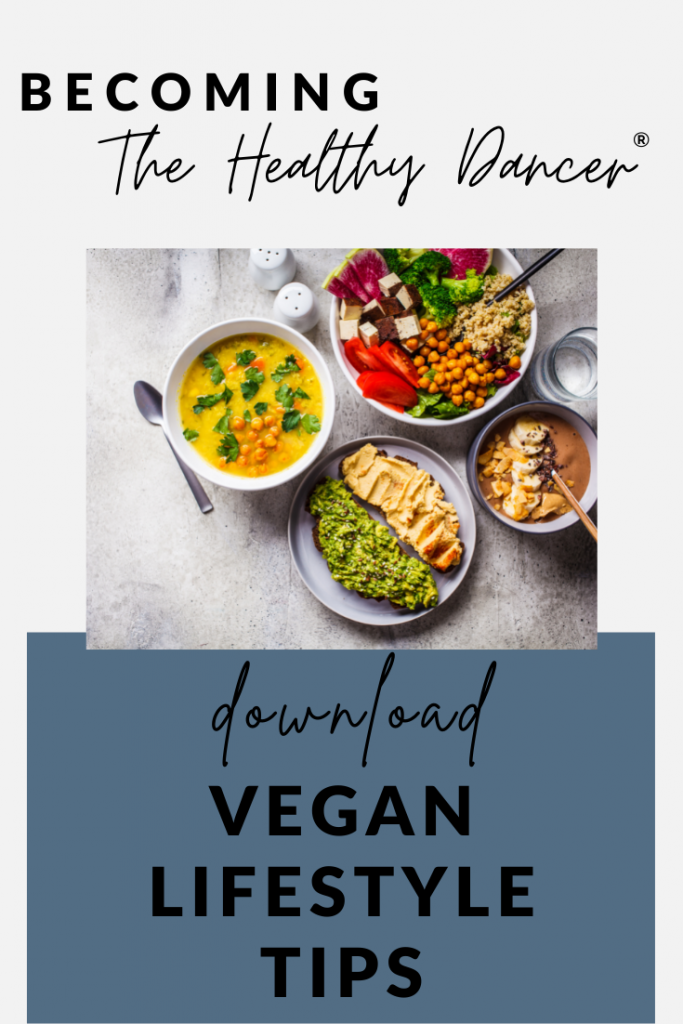Veganism is popular among dancers for a variety of reasons— for some, the intent is religious or cultural. For others, it’s to support the environment. For others, veganism offers hope to improve performance and health. While we can all benefit from adding more plants to our plates, knowing whether or not a vegan diet is doable for a dancer depends on several factors.
Vegan nutrition for dancers
This article is not meant to sway a dancer in any one direction. I am confident that a supportive lifestyle can be achieved with either a vegan or non-vegan diet. Rather, we’ll explore considerations for dancers who are already vegan or may be debating whether or not to start.
Vegan Dancers: What Are The Concerns?
A dancer’s nutritional needs are higher than that of the average person. This is especially true for adolescent dancers whose growth needs span beyond those of an average adult. Because of the restrictive nature of vegan diets and the potential challenges with accessing vegan-friendly options, dancers must consider the practicality of maintaining such a lifestyle. Here are a few concerns:
#1: Veganism Can Mask Disordered Eating
The benefits of adding more plants to our plates are vast— I’ve previously written about how to do this. But veganism, in particular, is often depicted alongside “wellness” rhetoric— dairy-free, gluten-free, and “clean,” to name a few. Dancers might be attracted to veganism in their pursuit of control at mealtimes or their desire to attain an unrealistic body aesthetic.
A vegan diet, however, is not necessarily a “healthier” or “better” diet for a dancer. Using veganism as a mask for restrictive (disordered) eating not only risks your physical performance but also, sacrifices your emotional and mental well-being. If your reason for turning to veganism stems from dieting or is causing you major food anxiety, then you’ll need to reassess.
With that said, vegan diets don’t have to be restrictive or disordered. Vegan diets should also never equate to a diet low in calories or fat. Research suggests that “appropriately planned vegetarian, including vegan, diets are healthful, nutritionally adequate, and may provide health benefits for preventing and treating certain diseases. These diets are appropriate for all stages of the life cycle.” Proper planning is not only encouraged but also manageable. Today’s food landscape offers a variety of options to support vegan swaps. To learn more about how to do this, consider my ebook for Plant-Based Lifestyles.
#2: Nutrient Deficiency and Bone Health
For vegan dancers, there are also concerns about nutrient deficiencies. The body’s access to vitamin B12, vitamin D, calcium, protein, omega-3 fatty acids, and iron is limited when relying on only plant-based foods. It has also been argued that veganism might negatively impact bone health (though any associations between veganism and bone health are limited as poor nutrient intake from ANY diet, not just veganism, can weaken bones).
All dancers, even non-vegans, are at risk for nutrient deficiencies from limited access (whether intentional or unintentional) to a balanced diet. Whether vegan or non-vegan, the vitamins and minerals mentioned above can be consumed in adequate amounts using a food-first approach. Focusing on variety and abundance is key.
#3: Meal Satisfaction
Food isn’t just about nutrients and calories. Satisfaction is essential to our daily lives. You can eat all the veggies you want and physically fill your stomach, but if you’re not satisfied, you might wind up cycling between restricting and over-eating. Finding enjoyment and satisfaction from your meals is as important as optimizing your meal’s nutrient density.
Despite these concerns, dancers can still thrive physically and mentally while following a vegan lifestyle. It just takes more effort, self-reflection, and exploration. Focusing on abundance and variety is key to preventing the potential for nutrient deficiencies (read about here).
Vegan Dancers: Know Your Intentions
Many view veganism not as a diet, but as a lifestyle built upon values and ethics relating to how humans treat other living beings like animals. Food activism also presents many strong ideas about how humans can and should support the environment. As author and food activist Michael Pollan says, “Eat food. Not too much. Mostly plants.” This advice seems harmless — from a nutritional standpoint, plant foods are chock full of nutrients. And yes… we should treat others, including animals, with compassion and love. We should also care for the well-being of our environment.
But there’s a tricky side to this rhetoric. It’s one of the culprits that causes and exacerbates disordered eating among dancers. As a dietitian, I’ve worked with and heard from thousands of dancers who have (unknowingly) experienced complications in their food struggles related to the pursuit of “clean” eating. There are exceptions. Not all efforts of food activism will challenge one’s relationship with food, but that’s especially rare for a population highly vulnerable to disordered eating. Choosing a vegan lifestyle does not make one dancer morally superior to another. Also, choosing a vegan diet for reasons like weight loss, “health,” or to manipulate your body shape/weight/size is both dangerous and unsustainable.
But I care about animals and I want to support a greener environment
For dancers with longstanding beliefs of environmental sustainability and animal welfare, it is possible to maintain a vegan lifestyle that is not restrictive nor tampered by diet culture. But as Christy Harrison explains, plant-based eating and the surrounding rhetoric of “clean” and “pure” food can, more often than not, trigger disordered eating.
To ensure that you’re reasoning for choosing veganism is helping and not hindering you, assess your INTENTIONS:
DON’T follow a vegan lifestyle if:
- You’re looking to be “healthier” and feel motivated by wellness culture to eat “clean”
- You’re looking to change your body weight/shape/size
- Your peer is doing it… and you feel competitive
- You think it’s a “superior” way of living (cause it’s not)
DO consider a vegan lifestyle if:
- You’ve become increasingly interested in environmental sustainability
- You’re concerned about animal welfare
- You follow vegan-style religious or cultural traditions
Your vegan lifestyle doesn’t have to be all-or-nothing
You can support animal welfare and environmental sustainability without manipulating your food choices. You can volunteer at animal shelters, foster rescue animals, and help with fundraising for animal-rights organizations. As for the environment, roughly two-thirds of global carbon emissions come from fossil-fuel companies. Rather than jeopardizing your relationship with food by cutting out certain options, consider your role in voting for legislative representatives interested in regulating the large-scale pollution coming from these companies.
Ultimately, your choices are exactly that: yours. There should be no judgment surrounding your decisions. Most important is that you’re considering your relationship with food in addition to the above priorities. If you are choosing veganism, I encourage you to work alongside a dietitian. This ensures your daily menu supports your body’s physical and metabolic needs while supporting your mental well-being. To help you get started, I created an ebook that dives into everything you need to know about plant-based lifestyles. You can access it here.
Veganism: What does the research say?
There isn’t much research on veganism and dancers, but we know that vegetarian athletes are at higher risk for the nutrient concerns mentioned above. It’s also important to remember that vegan athletes might be more susceptible to bone-related injuries like stress fractures and female dancers with delayed menarche (a fancy word for your first period) are particularly at higher risk for low bone density.
However, we also know that a well-planned vegan or vegetarian diet is doable at any life stage and the same is true for athletes. Though the research doesn’t specifically address dancers, it is safe to say that a dancer’s physical nutritional needs are comparable to an athlete’s. But a dancer’s susceptibility to disordered eating makes it even more critical that, if choosing a vegan lifestyle, one consult with a dietitian to ensure their diet also supports their mental well-being.
5+ Cooking Swaps for Vegan Dancers
Now that we’ve identified and reevaluated your intent for choosing a vegan diet, along with discussing the importance of seeking additional support to ensure your nutritional needs are met, let’s explore a few cooking tips and ingredient swaps that can help vegan dancers create delicious, plant-based meals that compare to their non-vegan counterparts.
#1: Tofu for Eggs
Tofu is a versatile ingredient that can replace eggs in many recipes. Try making a tofu scramble for breakfast or use silken tofu in baking for a creamy, egg-like texture. Here’s a simple tofu scramble recipe to get you started:
Ingredients:
- 1 block of firm tofu
- ¼ cup nutritional yeast
- ½ teaspoon turmeric
- Salt and pepper to taste
- Veggies of your choice (bell peppers, onions, spinach, etc.)
#2: Nutritional Yeast for Cheese
Nutritional yeast has a cheesy, nutty flavor and is an excellent substitute for cheese in various recipes. Here’s a simple creamy vegan mac and cheese to try:
Ingredients:
- 2 cups cooked elbow pasta
- 1 cup unsweetened plant-based milk
- ¼ cup nutritional yeast
- ¼ cup vegan butter
- Salt and pepper to taste
#3: Plant-Based Milk and Yogurt for Dairy
Swap dairy milk for plant-based alternatives like almond, soy, or oat milk in your recipes. Use almond milk in this vegan pancake recipe:
Ingredients:
- 1 cup all-purpose flour
- 1 tablespoon sugar
- 1 tablespoon baking powder
- ½ teaspoon salt
- 1 cup almond milk
- 2 tablespoons vegetable oil
#4: Mushrooms for Meat
Mushrooms, especially shiitake and portobello, have a meaty texture and umami flavor. Use them as a swap for a meat patty or as a substitute for any meat-based dish.
Ingredients:
- 8 oz sliced mushrooms
- 1 onion, chopped
- 2 cloves garlic, minced
- 1 cup vegetable broth
- 1 cup plant-based sour cream
- Cooked pasta or rice
#5: Coconut Milk for Cream
Coconut milk can add creaminess to your recipes without dairy. Here’s a vegan red curry dish made with coconut milk:
Ingredients:
- 1 can of coconut milk
- 2 tablespoons red curry paste
- Mixed Vegetables
- Tofu or chickpeas
- Jasmine rice
#6: Avocado for Butter
Avocado is a fantastic butter replacement in baking and spreads. Try this avocado chocolate mousse as a snack or dessert:
Ingredients:
- 2 ripe avocados
- ¼ cup cocoa powder
- ¼ cup maple syrup
- ½ teaspoon vanilla extract
#7: Flax Eggs for Binding
Flax eggs (ground flaxseeds mixed with water) work as a binding agent in baking. For any recipe, mix 1 tablespoon of flax meal with 3 tablespoons of water, and let sit for 5-10 minutes before using.





